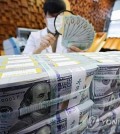- California Assembly OKs highest minimum wage in nation
- S. Korea unveils first graphic cigarette warnings
- US joins with South Korea, Japan in bid to deter North Korea
- LPGA golfer Chun In-gee finally back in action
- S. Korea won’t be top seed in final World Cup qualification round
- US men’s soccer misses 2nd straight Olympics
- US back on track in qualifying with 4-0 win over Guatemala
- High-intensity workout injuries spawn cottage industry
- CDC expands range of Zika mosquitoes into parts of Northeast
- Who knew? ‘The Walking Dead’ is helping families connect
Police investigate suspected illegal house-sharing biz involving Moon’s daughter
Police have secured CCTV footage of a studio apartment owned by former President Moon Jae-in’s daughter as part of an investigation into allegations that she illegally operated a house-sharing business without official declaration, officials said Monday.
The announcement came as police have been conducting a preliminary investigation into suspicions that Moon Da-hye illegally operated her studio apartment in Seoul’s Yeongdeungpo district and a house on the southern Jeju Island for house sharing without the necessary official declaration.
Under the Public Health Control Act, owners of studio apartments, known as “officetel,” must file a declaration with the district office and install the necessary equipment to operate their properties for house sharing.
Woo Jong-soo, head of the National Office of Investigation, said that police have secured CCTV footage of Moon’s officetel, and an analysis is currently under way to determine whether there were actual guests and if it was operated as a hospitality facility.
After the analysis, police plan to decide whether to formally book her for investigation, Woo said, adding that they will also determine if in-person questioning is necessary.
Earlier this month, Moon was questioned by police over alleged drunk driving after her car collided with a taxi while changing lanes in Seoul’s Itaewon district on Oct. 5.
Her blood alcohol concentration was measured at 0.14 percent on the night of the accident, exceeding the 0.08 percent threshold for driver’s license revocation.











